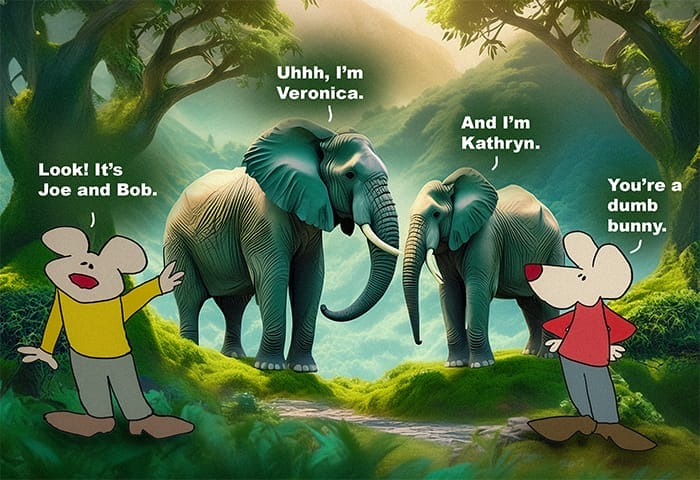Sometimes, our world just sparkles, doesn’t it?
Like this.
Today, I learned that elephants have names for one another.
When I first read this headline, I thought, “Now, how in the world could we humans ever know that?”
But. As it turns out, scientists can be very smart people. They are able to keenly observe situations and record the information gathered by their observations.
So there it is. A bunch of very intelligent scientists spent a great amount of time observing elephants in the wild. And they gathered information about the elephants’ behaviors. They wrote an article about it. And now I’m sharing it with you.
The point is? Our world can be sparkly and magical. That is what I have observed.
Back to the elephants and their scientists. Here is what they found.
Elephants speak to one another for one thing.
And they do this in tone so very deep and low, that the human ear is unable to detect these sounds.
So you may be standing right next to an elephant at the zoo, and it might be talking to its buddies, and you would not hear a thing. That’s low.
Anyway, in the wild, elephants use this very distinct language, making many different sounds. The scientists noticed that one sound would alert a certain elephant, and they would respond. And then another sound would alert another elephant, and they would respond. And so on. And each individual elephant would “respond” to the one sound repeatedly over time.
These specific and unique vocalizations are, of course, not as articulate as human speech but rather distinct low rumbling sounds. Still, they’re names nonetheless.
Much like when you say, “Hey, Polly.” And I look up at you and respond by saying, “Hey, what?”
And then someone else says, “Hey, Polly.” And I go over to them and say, “Whatcha’ need?” And so on.
All of this took place in northern Kenya’s Samburu ecosystem and southern Kenya’s Amboseli National Park.
Some of the specifics? Well, they identified specific rumbles for 119 individual elephants.
Some of these rumbles were played back to many of those wild elephants. When the elephants heard their names, they were more likely to move quickly toward the sound source and vocalize faster in response.
The researchers also noted that calls to the same elephant by different callers were happening. So this indicates that many different elephants know the name of one elephant — a multi-layered communication system.
Now, the big question remains: how do those names translate?
Are they like George, Betty, Frank, Louise?
Or are they like Simba, Nara, Jabali, Nyah?
Or maybe like Peanut, Snuffles, Trunky, Floppy?
Perhaps if we ask, they’ll use name tags. But we’d have to buy them some big-ass Sharpie markers.
“””””””””””””””
“A name represents identity, a deep feeling and holds tremendous significance to its owner.” – Rachel Ingber
“””””””””””””””
“Your name is the single most important component of your personal brand. It is your first impression and defines you for life.” – Patrick Fletchinger
“””””””””””””””
“A name is the blueprint of the thing we call character. You ask, What’s in a name? I answer, Just about everything you do.” – Morris Mandel
“””””””””””””””
What’s your name, you big gray guy?
